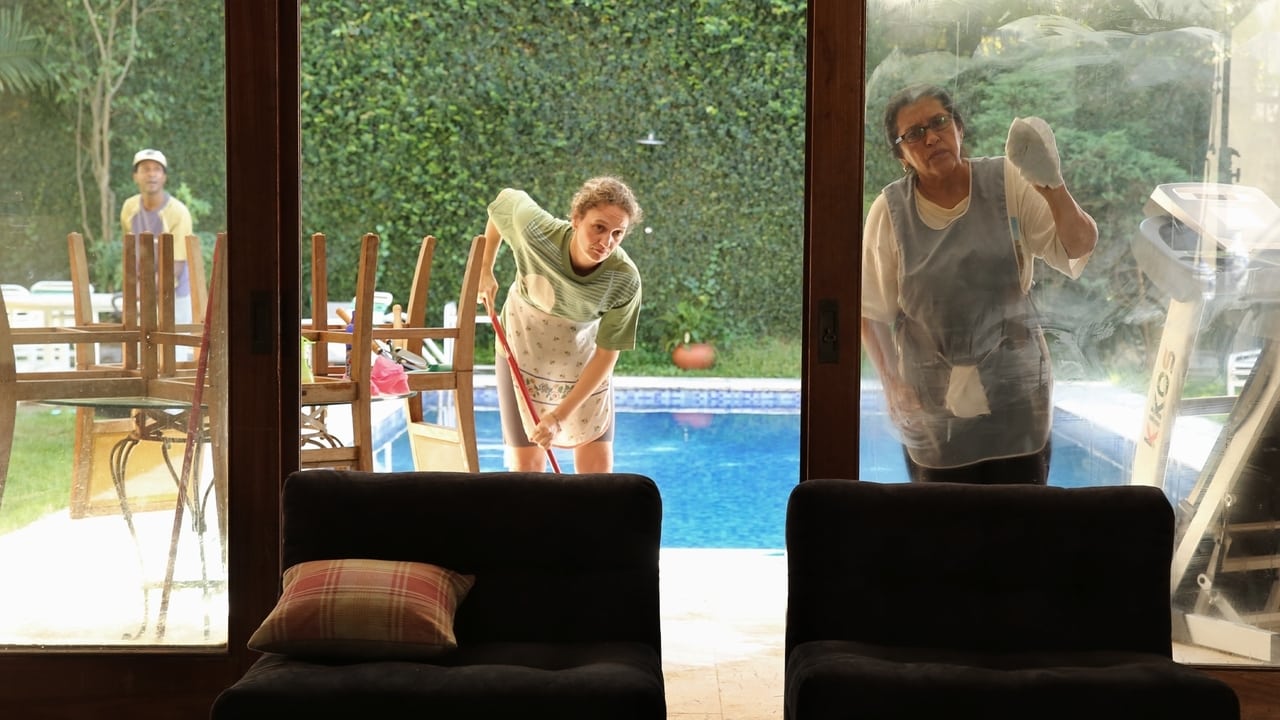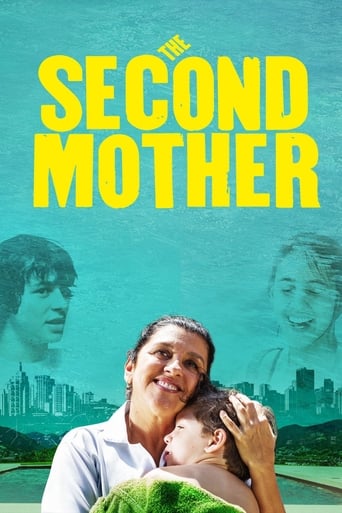



Best movie of this year hands down!
In truth, there is barely enough story here to make a film.
View MoreIf you're interested in the topic at hand, you should just watch it and judge yourself because the reviews have gone very biased by people that didn't even watch it and just hate (or love) the creator. I liked it, it was well written, narrated, and directed and it was about a topic that interests me.
View MoreThe story, direction, characters, and writing/dialogue is akin to taking a tranquilizer shot to the neck, but everything else was so well done.
View MoreThe name of the film 'The Second Mother' carries two meanings: when a young woman comes to live with her mother, having been brought up by a relative, she is getting a second parent; that parent, meanwhile, has acted as a second mother to a child in a household where she's worked for many years as a maid. Her long-term relationship with her employers is such that she is treated both as part of the family but also as a servant, a member of a wholly inferior class; in her own mind, she sees only the former, and avoids thinking about how she is "one of them" only when it is convenient for them, not for her. Her daughter, of course, doesn't see the world through such a prism, causing sparks to fly; but the latter's self-righteousness turns out to hide her own secrets. The film is nicely observed, and not over-acted, and mostly follows the axiom of "show don't tell". The ending, however, seems a bit glib: if it was possible to work everything out this way, why has it not happened before?
View MoreThis movies tells the interesting story of a nanny, Val, and her daughter, Jessica. The two have not seen each other in about ten years, and out of the blue, Jessica calls and is on her way to Sao Paolo to begin applying for university. The rest of the movie is a portrayal of Jessica and Val's rocky relationship over the socioeconomic classes that dictate Val's oppressed behavior. The most confusing part of the story for me is Jessica's aggressive reaction to her mother's position within the family that she is serving. The movie does not go into much details as to where Jessica was raised, but it is hinted that she came from the northeast. Her attitude is almost entitled as if she too is coming from the highest of the socioeconomic class of Brazil. While I disagree with the manner in which Val is treated by the family, there are certain social graces that most people understand regardless of socioeconomic class. Jessica's aggressive behavior causes a lot of tension between her and her mother, and I still do not understand where this is coming from. WE do not know if she is coming from a higher socioeconomic class than her mother. My theory is that she maybe is harboring a little bit of jealousy. Val has more or less been the mother figure to the son of the family, Fabrinho. While Jessica at a young age, had her mother stolen from her, Fabrinho had two. Sort of. Val seems to be kinder and more caring towards this young boy that is not even her own child. As a daughter, that must be hard to watch, and that is why I believe that Jessica is a little aggressive in her behavior at the family's home. The children of the domestic workers are almost getting the short end of the stick. She had to grow up without really knowing her mother, at the same time that her mother was taking care of a child that is not her own.
View MoreThe Second Mother (2015) directed by Anna Muylaert is a fascinating film. I really love that the director focuses on positive aspects of topics that are not normally spoken about positively.This film focuses on the life of the protagonist Val. Val moves to Sao Paulo leaving her daughter behind to provide a better life for her. In Sao Paulo, Val works as a maid for a wealthy family. She lives with this family and takes care of the only child of the family, Fabinho. When Val's daughter, Jessica, is almost eighteen years old, she calls Val asking if she can live with her while she studies to take the admission exam at the University of Sao Paulo. Val asks the family she lives with for permission to let Jessica live with them while they look for an apartment for both of them. The lady of the house, Dona Barbara, gives Val permission. When Jessica arrives at the house of the wealthy family, she is surprised that she expects her to sleep in the tight room where Val stays. Dona Barbara's husband, Don Carlos, is attracted to Jessica. He lets her do what she wants and treats her like a person of the family. Val scolds Jessica a lot and tells her that she should not have social interactions with the family because they are poor.I love Jessica's character and the positive use that the director gave to that character. For example, the director gives a poor person access to one of the best universities in Brazil. On the other hand, a rich boy did not pass the exam to enter that university. I loved this because the director changed the typical stereotype. The director also did this with Jessicas' character by making her self-confident and fighting for her rights.
View MoreIt's not everyday that we get a film like this, not willing to really dive into the political, social issues that pervade everyday life, and the cultural barriers and differences that micro- aggressions really make. The acting in this is superb, especially from Regina Case. It's all very natural and in the vein of real life, to an almost unbearably disturbing extent. The screenplay and directing are superb. None of it is at all showy, but it all builds up to quietly powerful, and deeply emotional, moments and scenes. The characterization is rich and it all really sneaks up on you in terms of its effect. definitely recommended, although it's not for those wanting loud or showy extravaganza.
View More